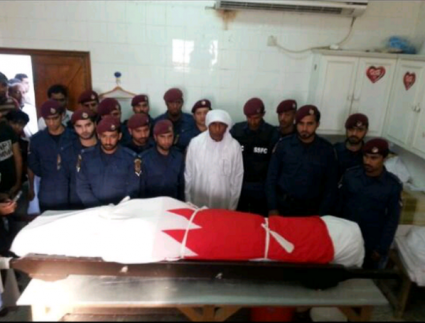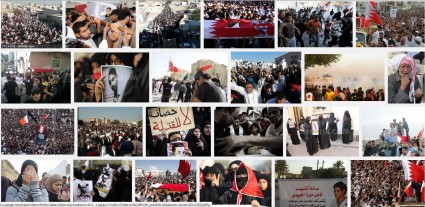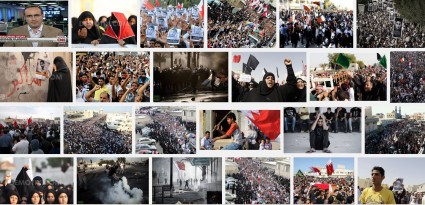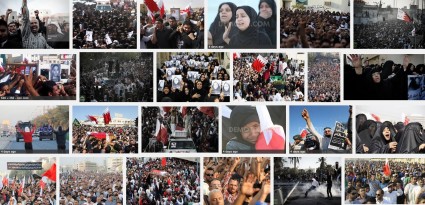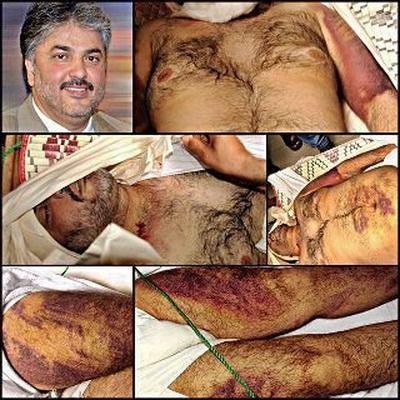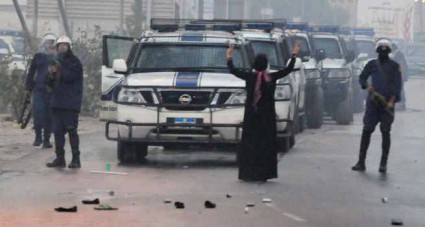Media Corruption in US Conceals Atrocious System of Human Rights Abuse in Bahrain and Saudi Arabia
February 17, 2014 No Comments
Insulting the King – Crushing Oppostional Voices and Bahrain’s Roller-coaster Scourage of Injustice
Bahrain: A Poet And A Journalist: Latest 2 Victims Of Criminalizing Freedom Of Expression Under The Pretext Of Insulting The King
16 February, 2014 – Bahrain Center for Human Rights
The Bahrain Center for Human Rights expresses its deep concern for the continued criminalization of freedom of opinion and expression in Bahrain under implausible pretexts such as the charge of ‘insulting the King’. In this context, the poet Ayat Al-Qurmuzi was interrogated regarding one of her poems, and the journalist Abbas Al-Murshid was summoned to court.
On 3 February 2014, the Bahraini poet Ayat Al-Qurmuzi (23 years old) was summoned for interrogation at the Central Governorate Police Station regarding a poem[i] she recited on 24 January 2014 at an opposition rally in the area of Sitra. The poet said that the interrogators, who were a male and a female police officers had asked her about the ‘meanings of the verses and people or bodies intended by them’, while no name, person or body was mentioned in the poem which generally addressed injustice.[ii] The lawyer was not permitted access to the interrogation room although she was present at the police station. The poet was charged with two accusations ‘insulting the King and incitement to hatred against the ruling regime’ before she was released and after signing a pledge to appear before the police station upon request and with referring the case to the Public Prosecution. Worth mentioning, the complaint against the poet Ayat Al-Qurmuzi came as an order from the Office of the Deputy of Public Security.
The Bahraini poet Ayat Al-Qurmuzi had faced arrest in March 2011 on the background of the poems she recited amid the public gathering in Pearl Roundabout in February 2011, she was sentenced to a year in prison in June 2011 by a military trial, however she was released in July in 2011 under massive pressure from human rights organizations. Al-Qurmuzi stated after her release that she was subjected to torture[iii] and maltreatment during her arrest by officers, one of them is a member of the ruling family named Noura Al-Khalifa. Although a show trial had taken place for the officer Noura Al-Khalifa on the charge of ‘assaulting the integrity of the body of (torturing) Ayat Al-Qurmuzi’ since 2012, yet a verdict has not been made in the case so far. …more
A young Bahraini woman who was arrested after reciting an anti-government poem to demonstrators in the Gulf kingdom said she was beaten, electrocuted and threatened with sexual assault while in custody. Miss al-Qurmezi, a member of the Shia majority who was at teacher training college when the protests began in February, was filmed reciting poems to a huge crowd at Pearl Roundabout, the epicentre of the demonstrations
Bahraini woman poet tells of torture while in custody
By Richard Spencer – 14 July, 2011
Ayat al-Qurmezi, 20, became one of the symbols of the protests that hit the centre of the Bahraini capital, Manama in February and March. After she was arrested, reports circulated that she had been whipped and even at one point raped and killed, leading to an improvement in her conditions and her release on Wednesday evening.
Greeted by a crowd of hundreds of people at her home, she told her family she had not been sexually assault but threatened as well as being electrocuted with clips attached to her face.
She also denied that she had committed treason by attacking the king, saying she wanted reform not revolution. “The demand isn’t to overthrow the regime, but we want a real constitutional monarchy,” she said to reporters.
Miss al-Qurmezi, a member of the Shia majority who was at teacher training college when the protests began in February, was filmed reciting poems to a huge crowd at Pearl Roundabout, the epicentre of the demonstrations.
One featured a conversation between Satan and King Hamad in which they outlined the complaints of the opposition, mostly Shia calling for the Sunni royal family and elite to share power. …more
February 17, 2014 No Comments
Bahrain: Sad Dead Policeman – but Really, Who’s Counting?
February 17, 2014 No Comments
Prince Charles Should Punch Kings in Face over Human Rights Abuses During Qatar, Saudi Arabia Tour
Prince Charles Must be Brave and Tackle Human Rights Abuses During Qatar and Saudi Arabia Tour
By Eleanor Blatchley – 17 February, 2014
Prince Charles is keen on charity. He has personally founded 17 charities working for better education and better opportunities for British youth, responsible business, and a sustainable environment. He is also a passionate advocate of inter-faith dialogue. At a well-publicised Christmas reception, he stated that “an emphasis on love of neighbour and doing to others as we would have them do to us are the ultimate foundations of truth, justice, compassion and human rights”.
These are commendable principles. Will the Prince actively promote them when he travels to Saudi Arabia and Qatar on an official visit next Monday? Or when it comes to his reported friendship with King Abdullah bin Abdulaziz Al Saud, ruler of Saudi Arabia and Sheikh Tamim bin Hamad bin Khalifa Al Thani, the Emir of Qatar, will these values be eclipsed by efforts to advance arms deals and commercial contracts?
“The Prince of Wales’s return to the region, only one year after his last visit, demonstrates the importance the British Government places on its association with key partners in the area,” said Sir John Jenkins, the UK’s ambassador to Saudi Arabia. Sir John went on to say that Prince Charles will advocate interfaith understanding and that he and King Abdullah share a deep concern about the “enormous turmoil and human agony in the Middle East”.
But does that concern extend to the prominent Saudi human rights activists sentenced to long prison terms on account of their peaceful activism, or to Saudi women and girls subject to systematic discrimination, or to the millions of foreign workers, some of them living in conditions of forced servitude? Let’s hope Their Royal Highnesses also discuss the agony of the 64 people reportedly executed in Saudi Arabia between January and November 2013, mostly by public beheading.
According to Ambassador Nick Hopton, the Qatar visit is “an opportunity to showcase the strong ties between the UK and Qatar, which we value greatly”. Will the Prince also use it as an opportunity to raise the plight of migrant workers? The timing would be opportune – only this week the Government’s Qatar Supreme Committee released its Workers’ Welfare Standards in a credible attempt to rectify the shockingly poor conditions for migrant workers building the 2022 World Cup stadiums. Consistent with his commitment to responsible business, the Prince should suggest to the Emir that, while a good start, the new measures fall well short of the reforms that Qatar’s low-paid and routinely exploited migrant workers need so badly. …more
February 17, 2014 No Comments
Lessons from Bahrain – Morocco police beat Pro-independence Protests in front of British MPs
Morocco police beat Sahrawi protesters as British MPs visit: NGO
17 February, 2014 – Al Akhbar
Plainclothes Moroccan police violently broke up a peaceful pro-independence protest in the Western Sahara city of Laayoune after a visit by a British MP, a prominent Moroccan rights group said Monday.
About 100 activists, including women, gathered on Saturday evening in the neighborhood of Maatallah, despite police efforts to block the protest, according to Hamoud Iguilid from the Moroccan Association of Human Rights (AMDH).
“All the citizens who tried to protest were attacked by the police, and especially plainclothes police,” he told AFP, speaking by phone from Laayoune, adding that he had not been informed of any serious injuries.
The protesters were demanding the release of political prisoners and an extension of the UN peacekeeping force’s mandate to include human rights monitoring.
They were attacked after a car carrying British MP Jeremy Corbyn and a member of the AMDH had left the area, Iguilid said.
Corbyn chairs a British parliamentary group dedicated to raising concerns about Western Sahara, and he was visiting the region with a delegation of British politicians and a rights campaigner.
Moroccan authorities could not immediately be reached for comment.
The deputy regional director of Human Rights Watch, Eric Goldstein, who was in Laayoune at the time, confirmed that more than 100 uniformed and plainclothes police had tried to prevent the protest.
“Twice as I tried to approach, plainclothes officers turned me back ‘for my own protection,'” Goldstein said, adding that the governor of Laayoune later accused the visiting British delegation of trying to incite the protesters to riot.
Morocco controls most of Western Sahara, which it began annexing in 1975 in a move never recognized by the international community, and which it considers an integral part of its territory. …more
February 17, 2014 No Comments
Videos, Photos Offer Evidence of Press Corruption by Gross Understimation of Protest Size in Bahrain
The Western Press has deliberately underestimated the size of Bahrain Anniversary Protest. They have consistently reported the crowd size at 10s of thousands, when photo evidence suggests crowds in the 100s of thousands. This is an indication that Al Khalifa Public Relations Dollars have effectively bought “Western Media” outlets to “contrive a false reality” about the Situation Bahrain. Phlipn Out.
February 17, 2014 No Comments
3 Years Unmitigated Human Rights Abuse – OHCHR to Affirm it’s committment to Al Khalifa’s Charade
And the Bullshit just keeps coming and the UN Continues the Charade
Switzerland read the following joint statement on the opening day of the 24th Session of the Human Rights Council on behalf of 47 co-sponsoring countries including the United States.
24th Session of the Human Rights Council
Item 2 – General Debate
Joint Statement on the OHCHR and the human rights situation in Bahrain
Geneva, 9 September 2013
Mr. President, I have the honour to make this statement on the OHCHR and the human rights situation in Bahrain on behalf of Albania, Andorra, Australia, Austria, Belgium, Bosnia and Herzegovina, Botswana, Brazil, Bulgaria, Chile, Costa Rica, Croatia, Cyprus, Czech Republic, Denmark, Estonia, Finland, France, Germany, Greece, Hungary, Iceland, Italy, Ireland, Latvia, Liechtenstein, Lithuania, Luxembourg, Macedonia, Malta, Mexico, Monaco, Montenegro, Netherlands, Norway, Poland, Portugal, Romania, Serbia, Slovak Republic, Slovenia, Spain, Sweden, Switzerland, United Kingdom, the United States of America and Uruguay.
We take note of positive steps taken by the Government of Bahrain to implement the recommendations of the Bahrain Independent Commission of Inquiry in order to improve the human rights situation in Bahrain. In particular, we note with appreciation the creation of the Office of the Police Ombudsman for the Ministry of Interior in August 2012 and its official launch in July 2013. We also note the creation of the Special Investigation Unit in the Public Prosecution Office in February 2012. We urge these institutions to proactively fulfil their mandate and encourage the Government of Bahrain to uphold its commitment to these institutions and their independence. We commend the continuation of the National Consensus Dialogue in August 2013 and encourage all sides to participate in a constructive and genuine way. We encourage the Government of Bahrain to continue to work with all participants in the Dialogue towards an open, democratic and inclusive society with equal opportunities for all.
However, the human rights situation in Bahrain remains an issue of serious concern to us. In particular, we share the concerns expressed by the OHCHR regarding the 22 recommendations made by the National Assembly of Bahrain on 28 July 2013. Any new legislation to implement these recommendations must meet international standards and ensure human rights are protected. We are also particularly concerned by the ongoing violation of the rights to freedom of peaceful assembly and association and the repression of demonstrations. We expect officials and protestors to refrain from any violence. Furthermore, we continue to be concerned about the continued harassment and imprisonment of persons exercising their rights to freedom of opinion and expression, including of human rights defenders. We are also concerned about the cases of revocation of nationality without due process, some of which might lead to statelessness. Lastly, we are concerned that those alleged to have committed human rights violations are often not held accountable.
We call upon the Government of Bahrain to address these concerns and expedite the implementation of the recommendations received from the Bahrain Independent Commission of Inquiry and the recommendations Bahrain agreed to accept through the Universal Periodic Review. We urge the Government of Bahrain to enhance its cooperation with the OHCHR and allow for a fully comprehensive collaboration, including accepting an OHCHR follow-up mission. We also urge the Government of Bahrain to cooperate with the Special Procedures of the Human Rights Council, in particular the Special Rapporteur on torture, the Special Rapporteur on the right to freedom of peaceful assembly and of association and the Special Rapporteur on the situation of human rights defenders, together with any other Special Procedures that request to visit Bahrain and reschedule previously planned visits. Lastly, we encourage the Government of Bahrain to fulfil its obligation to submit its outstanding reports to the treaty bodies of the human rights conventions it has ratified.
We will continue to follow closely the human rights situation in Bahrain and invite the OHCHR, Special Procedures and the Human Rights Council to do so. We also invite the Government of Bahrain to further engage with the Human Rights Council. Thank you Mr. President. …source
February 17, 2014 No Comments
3 Years of Rape, Torture, Murder, Gassing, Police Impunity, is Retalitation Against Police Surpirse?
February 17, 2014 No Comments
Will OHCHR Demand Justice for Karim Fakhrawi, Assassinated Co-founder of Newspaper Al-Wasat?
February 17, 2014 No Comments
Defiance Stands Her Ground; “One year of prison is nothing, We have a cause… This will not stop us.”
Activist Zainab al-Khawaja, jailed daughter of Bahraini human rights activist, Abdulhadi al-Khawaja, freed
By REEM KHALIFA – Associated Press – 16 February, 2014
MANAMA, Bahrain (AP) — Bahraini activist Zainab al-Khawaja was released from prison on Sunday after nearly a year behind bars for multiple convictions including participation in an illegal gathering.
Friends and supporters greeted her in a coffee shop in a main mall hours after her release. The cafe has served as a gathering point for activists since the small island-nation’s Arab Spring-inspired uprising.
“One year of prison is nothing,” she told journalists defiantly after her release. “We have a cause… This will not stop us.”
Bahrain’s majority Shiites have led a three-year uprising seeking a greater political voice in the Sunni-ruled Gulf kingdom, which is home to the US Navy’s 5th Fleet.
Al-Khawaja, who is popular online and on Twitter, said international attention should focus on an estimated 3,000 prisoners believed to be behind bars in Bahrain on politically related charges.
Her father is prominent human rights activist Abdulhadi al-Khawaja, who is among several opposition figures who are serving life sentences. He drew attention to his imprisonment with a lengthy hunger strike in 2012.
Her lawyer Mohammed al-Wasti said she still faces two trials, one this month and one next month, on charges that include damaging police property, defacing a picture of Bahrain’s king and insulting a police officer. …source
February 17, 2014 No Comments
OHCHR to Affirm Bahrain Progress on Human Rights, Chide Short Falls, leave it to return to Status Quo
NIHR welcomes OHCHR’s visit to Bahrain
15 February,, 2014 –
Manama, Feb. 14. (BNA) – The National Institution for Human Rights (NIHR) has welcomed the visit of the delegation of the UN Office of the High Commissioner for Human Rights (OHCHR) to Bahrain next Wednesday, and called upon all concerned ministries and NGOs to cooperate with it in order to assume its duties.
This came as an NIHR delegation, led by NIHR Deputy Chairman and Chairman of its Complaints, Monitoring and Follow-up Committee Abdulla Ahmed Al-Derazi, currently on a visit to Geneva to take part in discussing Bahrain’s third report before the 75th meeting of the Committee on the Elimination of Discrimination against Women (CEDAW), held a meeting with a number of OHCHR officials.
Al-Derazi said that the meeting was in line with NIHR’s keenness to cooperate and communicate with international human rights bodies, especially those of the UN, in order to enhance efforts to protect human rights.
He affirmed that the NIHR is looking forward to consolidating its cooperation with those bodies in order to benefit from their expertise to enhance its achievements in the human rights field.
He briefed the OHCHR delegation about the role and work mechanisms of the NIHR.
Members of the OHCHR delegation expressed keenness on enhancing cooperation with the NIHR, praising its role in promoting and protecting human rights in Bahrain. …source
February 17, 2014 No Comments
Revolutionary Youth – Insights from Stuart Hall’s Revolutionary Legacy
Hall’s work in cultural studies offers unique insight into the role of the youth in the Arab revolutions.
Stuart Hall’s revolutionary legacy
16 February, 2014 – Mark LeVine – AlJazeera
Of all the insights offered by the seminal Jamaican-British cultural theorist Stuart Hall, who passed away on February 10 this year, one of the most relevant for anyone concerned about the Arab world today was his argument that “identities are an endless, unfinished conversation.” It’s hard to think of a better summary of why the revolutions that started with so much hope across the Arab world in the winter of 2010-2011 have had such a hard time producing a positive outcome.
It’s not merely that elites and the systems that have long protected them remain too powerful for their peoples to bring down. It’s that in this long but still liminal historical post-Cold War moment, precisely what kind of “people” Egyptians, Moroccans, Libyans, Bahrainis and others want collectively to be remains very much undecided.
Stuart Hall is perhaps the best known exponent of the academic discipline of cultural studies, which emerged in the post-war era, first in the UK, then in the US and soon after that globally as one of the most important approaches to studying contemporary societies. From his early days with the New Left Review and then at the Centre for Contemporary Cultural Studies in Birmingham and the Open University, Hall’s research studied how and why political and economic systems retain the consent of societies, even when their policies do not serve their economic or political interests.
Of all the disciplines that emerged out of Karl Marx’s economic and historiographic theories, none could claim to have taken his call for schools not merely to interpret the world but openly to change it with and through the knowledge they produce as has cultural studies. Of course, whether or not they want or are willing to admit it, all scholars are engaged in the business of transforming the world, or at least people’s perception and experience of it. It’s just that most of the time they reinforce rather than challenge the status quo.
Recognising youth
Cultural studies’ activist roots run deep into the pre-World War II era, when studies of culture in Britain were relegated to workingmen’s associations lectures and adult education courses. It was only after the War that the burgeoning number of “youth” suddenly became a problem governments needed to address in order to manage society at large.
Building on the insights of thinkers like Antonio Gramsci and his concept of “hegemony,” Michel Foucault’s studies of the myriad ways power and knowledge flow through societies, and the seminal research of the Frankfurt School, cultural studies scholars explored emerging post-War British youth subcultures to understand how their unique sense of style, and their seemingly rebellious and threatening attitudes towards the establishment, most often reinforced rather than challenged the hegemonic political systems of the West.
From the start, cultural studies scholars understood that movements such as the Mods, Teds, hippies, punks, and hip-hoppers, all contained the potential for political action. Some even directly participated in powerful movements such as the civil rights and anti-war movements. Yet all fell prey to what Thomas Frank has so well described as the “conquest of cool” by capital – the seemingly ineluctable ability of the market to coopt, commodify and in so doing defang even the most subversive forms of popular culture.
Part of Hall’s genius was his ability to understand the relationship between the strengths and weaknesses of subcultures and the emerging global ideology and political economy of neoliberalism and neoconservatism, which he described under the rubric of “thatcherism”.
At the very moment that a neoconservative, semi-authoritarian populism was becoming politically, economically and culturally ascendant across the US and UK, Hall’s research opened up youth culture globally to investigation by scholars working in a variety of disciplines. The goal of his research was continuously to seek to make theory more relevant to practice, to provide tools for exploring popular culture that would help scholars not merely understand its dynamics, but help young people more successfully reshape their societies towards a more just and equitable future.
Sub-, counter- and revolutionary cultures
Given the importance of “youth” to any hope for political change in the Arab world (as the Carnegie Middle East Center put it not long before the outbreak of the Arab uprisings), the work Hall helped foster has opened innumerable paths to study the way culture, politics, and economics are aesthetically embedded in one another, in particular through the consumption of various forms of artistic production.
As the Arab world became more fully enmeshed in global neoliberalism and globalised Euro-American cultural norms and patterns of consumption began to penetrate the region, the need to apply the insights of cultural studies to the changes being experienced by the emerging generation of citizens became more important. The writing, was quite literally on the walls, in the soccer stadiums, in the lyrics of hiphop songs and the dark explosive sound of the local heavy metal scenes. All of these portrayed a situation far at odds with the rosy picture of countries like Tunisia and Egypt painted by the IMF and the World Bank.
Indeed, when I met the first generation of bloggers in Egypt and across the region in the 2000s, it was abundantly clear that they saw little place for themselves in the changing political-economic landscapes of their countries. They increasingly had the means to imagine, define and pursue alternative futures than the ones being – or rather, not being – laid out for them by their societies. …more
February 17, 2014 No Comments

